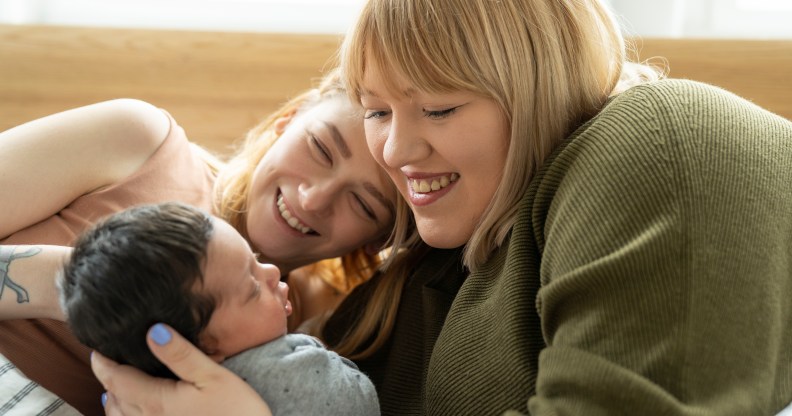Fertility expert warns on inequalities in lesbian IVF funding which are ‘overlooked for far too long’

The expert argues that women in same-sex relationships are disproportionately affected.
This Lesbian Visibility Week, a fertility expert is warning women about lesbian IVF funding inequalities in the UK which have been “overlooked for far too long”.
LGBTQ+ couples can become parents through a variety of options, including donor insemination, intrauterine insemination (IUI), surrogacy and adoption or fostering. For women in same-sex couples looking to become parents, IUI and IVF can sometimes be funded via the NHS. Still, eligibility depends on age, and local integrated care board (ICB) requirements.
Often, the rules are confusing for LGBTQ+ couples, who are expected to “try” to fall pregnant a number of times via self-funded options like IUI before the NHS are able to step in.
Back in March, a lesbian couple claimed they were refused an NHS referral for IVF unless they could “prove” they “were trying” for two years. Meanwhile, heterosexual couples do not need to fork out £700-1600 each cycle for IUI (as per the NHS) in order to be referred for the same services.
Now, reproductive rights advocate and founder of The Fertility Mentor, Claire Innes is speaking out against the disparity in IVF funding for lesbian couples.
“This issue needs to stand as visible as the women it affects,” Innes told PinkNews. “It’s a regrettable reality that lesbians are underrepresented when it comes to IVF funding.
“Progress in this area is coming but too slowly in my opinion.”
Innes notes that “funding is not consistent across the country”, which is in line with NHS guidelines which note that availability is dependent on the local ICB. “Women’s chances of receiving financial support depends heavily on their postcode and the policies of their local NHS trust.
“In numerous cases, lesbians are actually required to go down the route of private treatment and face the agonising experience of failure before they are even taken into consideration for NHS support.”
Innes continued, adding: “In a recent check of the 42 ICBs in England, only four were found to offer funding to lesbian couples who hadn’t first paid what is known as the ‘gay tax’.” This refers to the requirement for same-sex couples to prove infertility via IUI before becoming eligible for NHS assistance.
The HFEA found in 2023 that whilst the NHS funded 39% of IVF cycles for heterosexual couples, only 14% of patients in female same-sex relationships were funded by the NHS.
Innes continued: “This is an issue that should concern us all, not only because it speaks to matters of fundamental fairness and equality, but also because it underlines a more significant systemic problem in our society. An issue where the very people at the heart of fertility are facing biases, not due to their fertility potential, but because of their sexual orientation.”
NHS England previously told PinkNews: “In commissioning services, we have a responsibility to strike the right balance between meeting the clinical needs of local people, ensuring the best possible health outcomes and achieving value for money.
“NHS-funded assisted conception services are available to couples, including women in same-sex partnerships, where they meet the eligibility criteria set out in the ICB’s policy. The policy is publicly available on our website.
“If people do not fully meet the eligibility criteria, but their clinician feels there are exceptional clinical circumstances, then they can apply for exceptional funding. This application will be considered by the Individual Funding Request (IFR) Panel.”

